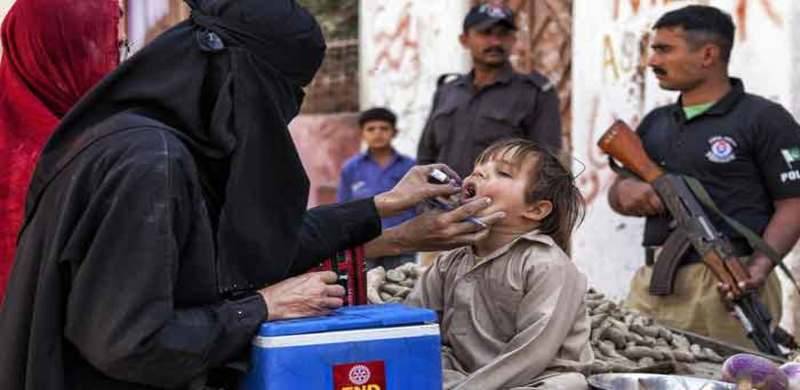
Islamabad
The Council of Islamic Ideology (CII) has endorsed around a hundred religious decrees (fatwas) in support of the polio vaccination.
According to a news report in Dawn, the apex body of the council made a decision to validate fatwas given by ulemas in support of the eradication of polio.
The CII has expressed concern over the travel restrictions imposed on Pakistan due to polio cases and possible financial restrictions that could be imposed in the furture.
Prime Minister’s Focal Person on Polio Babar Bin Atta stated to media that the government was seeking CII’s help for the first time in order to help control the virus.
Atta stated, “Since 2014, refusals against the polio vaccine began increasing on a religious basis due to which the polio programme began getting fatwas from religious scholars, madrassahs and even from the Al-Azhar University in Cairo [stating] that the vaccine is not against Islam.”
He added that research carried out at the National Institute of Health proved that the vaccine was halal.
The prime minister’s focal person on polio said that people used to doubt the authenticity of the fatwas in support of the polio vaccine. Hence, he added, “We approached the CII and asked it to validate the fatwas.”
Atta expressed the hope that the validation of the fatwas would help reduce the number of vaccination refusals in the upcoming anti-polio campaign in November.
Meanwhile, CII Chairman Dr Qibla Ayaz stated to media that around 30 percent of refusals to the polio vaccine were based on religious grounds, while the remaining 70 percent were for political or other reasons.
He apprised media that resistance to the polio vaccine increased after Shakil Afridi ran a hepatitis vaccine programme to help the United States Central Intelligence Agency located Osama Bin Laden.
He added that resistance against the vaccine increased following a propaganda campaign by a school in Khyber Pakhtunkhwa.
In April, students from a school in Mashokhel claimed to have had an adverse reaction to the polio vaccination. It was later found out that the incident was staged.
The chairman of CII stated that he would support the polio programme, adding that the council would play its role in helping reduce refusals.
The Council of Islamic Ideology (CII) has endorsed around a hundred religious decrees (fatwas) in support of the polio vaccination.
According to a news report in Dawn, the apex body of the council made a decision to validate fatwas given by ulemas in support of the eradication of polio.
The CII has expressed concern over the travel restrictions imposed on Pakistan due to polio cases and possible financial restrictions that could be imposed in the furture.
Prime Minister’s Focal Person on Polio Babar Bin Atta stated to media that the government was seeking CII’s help for the first time in order to help control the virus.
Atta stated, “Since 2014, refusals against the polio vaccine began increasing on a religious basis due to which the polio programme began getting fatwas from religious scholars, madrassahs and even from the Al-Azhar University in Cairo [stating] that the vaccine is not against Islam.”
He added that research carried out at the National Institute of Health proved that the vaccine was halal.
The prime minister’s focal person on polio said that people used to doubt the authenticity of the fatwas in support of the polio vaccine. Hence, he added, “We approached the CII and asked it to validate the fatwas.”
Atta expressed the hope that the validation of the fatwas would help reduce the number of vaccination refusals in the upcoming anti-polio campaign in November.
Meanwhile, CII Chairman Dr Qibla Ayaz stated to media that around 30 percent of refusals to the polio vaccine were based on religious grounds, while the remaining 70 percent were for political or other reasons.
He apprised media that resistance to the polio vaccine increased after Shakil Afridi ran a hepatitis vaccine programme to help the United States Central Intelligence Agency located Osama Bin Laden.
He added that resistance against the vaccine increased following a propaganda campaign by a school in Khyber Pakhtunkhwa.
In April, students from a school in Mashokhel claimed to have had an adverse reaction to the polio vaccination. It was later found out that the incident was staged.
The chairman of CII stated that he would support the polio programme, adding that the council would play its role in helping reduce refusals.
